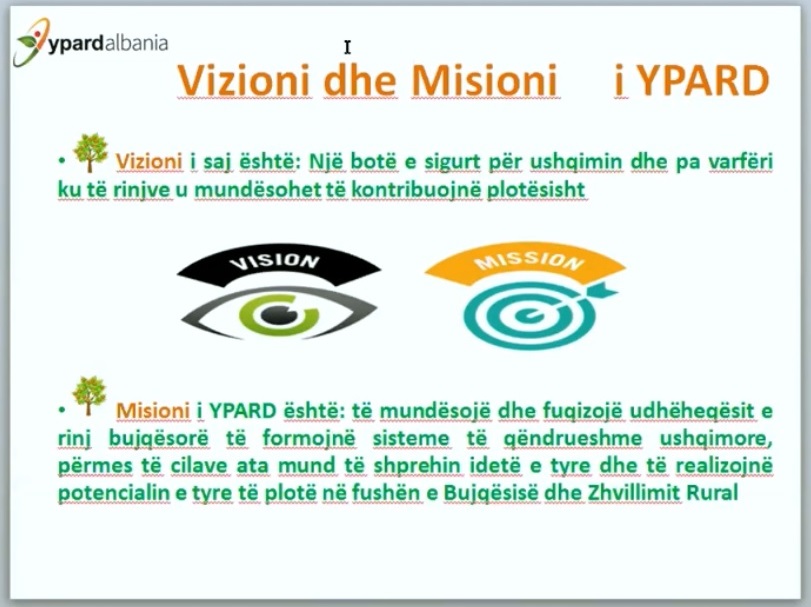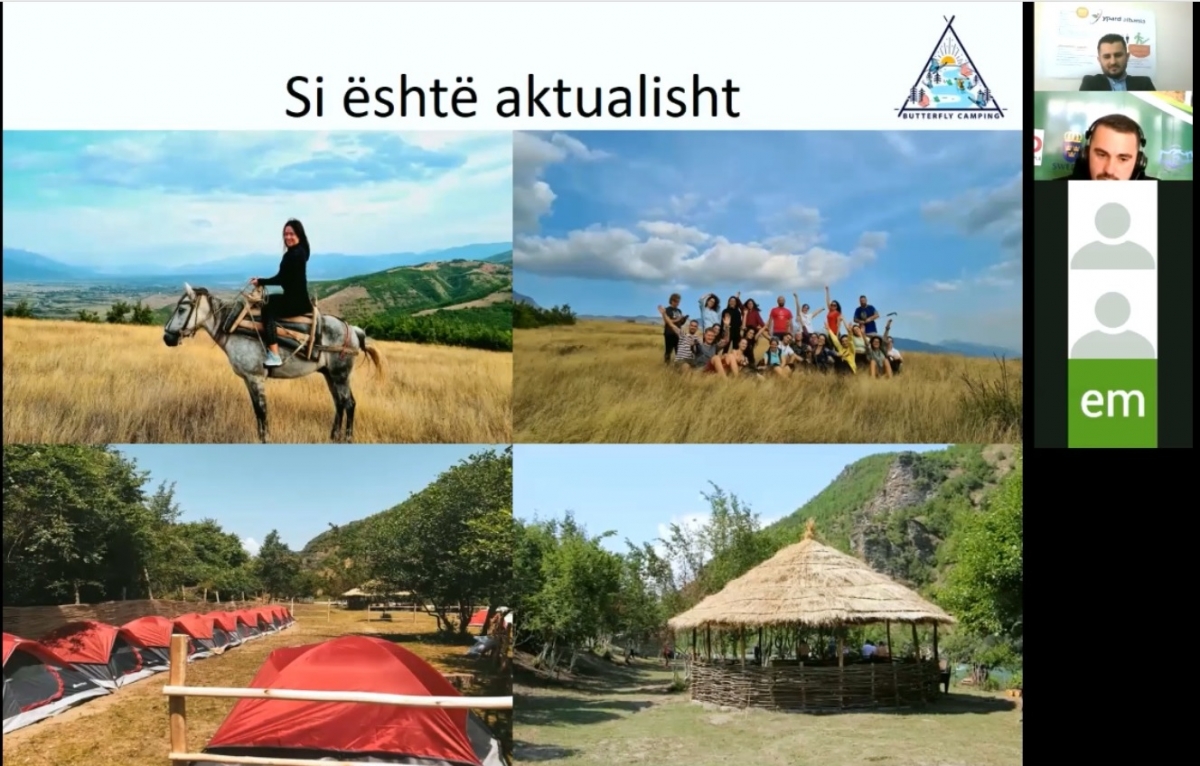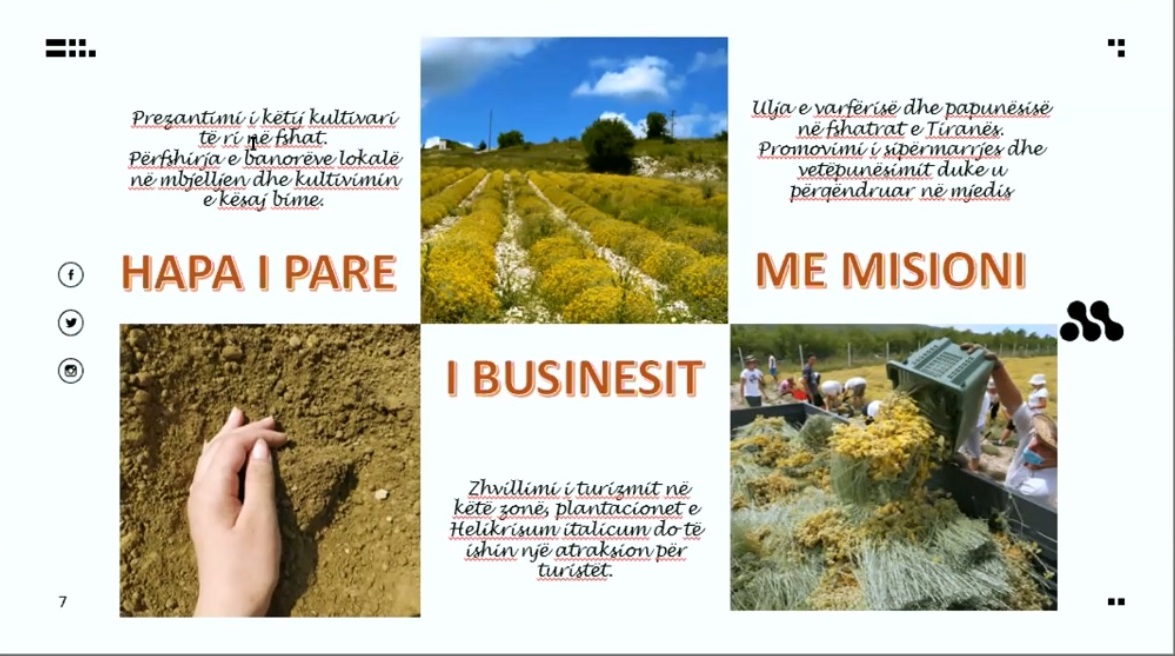-
About
- Our Work
- Get Involved
- Stay Updated
Youth engagement in agriculture post-Covid 19: challenges and opportunities
 On November 26, 2020, the YPARD Albania team consisting of Bledar Meta, Elda Muço and Benard Limani, held an online activity with the theme "Youth Engagement in Agribusiness and Agriculture Post-Covid 19, Challenges and Opportunities". This online activity was held on the Zoom platform and was moderated by Elda Muço and Bledar Meta.
On November 26, 2020, the YPARD Albania team consisting of Bledar Meta, Elda Muço and Benard Limani, held an online activity with the theme "Youth Engagement in Agribusiness and Agriculture Post-Covid 19, Challenges and Opportunities". This online activity was held on the Zoom platform and was moderated by Elda Muço and Bledar Meta.In this activity, YPARD and YPARD Albania were presented to all participants by Bledar Meta (Country Representative of YPARD Albania). At the end of this presentation, everyone was invited to become part of this global platform for young professionals for agricultural development. To offer everyone the opportunity to contribute to the development of agriculture and rural areas through this platform. Also to support them to become rural leaders and form sustainable food systems. This activity was held in cooperation with the Agricultural University of Tirana, and the participants in the activity were the master students in this University.
Invited as panellists to present about the topic in this activity were: two professors of the Agricultural University of Tirana, respectively
 Prof.Assoc.Dr. Etleva Dashi & Dr.sc. Shpresim Domi, and Assistant Professor PhD. Nol Krasniqi, from the University "Ukshin Hoti" Prizren in Kosovo. Who made a general presentation about these areas in Albania and Kosovo and their impact on the economy and rural development, also the effects of the COVID-19 pandemic in these areas.
Prof.Assoc.Dr. Etleva Dashi & Dr.sc. Shpresim Domi, and Assistant Professor PhD. Nol Krasniqi, from the University "Ukshin Hoti" Prizren in Kosovo. Who made a general presentation about these areas in Albania and Kosovo and their impact on the economy and rural development, also the effects of the COVID-19 pandemic in these areas.Also part of this activity were two young entrepreneurs in the field of agro-tourism and agribusiness, respectively Mr Labinot Murrja and Mrs Migena Xheleku, who presented their start-up the challenges they have had and still have, how they used the opportunities before and during the COVID 19 pandemic, and how they think they will operate afterwards. They motivated students to engage in these sectors and by showing them the opportunities that these two fields offer for them.
The panellists presented the following topics:
 Impact of Covid-19 on rural development
Impact of Covid-19 on rural developmentWhere the effects of Covid 19 on agriculture and rural development were presented and the impact that the pandemic had on these sectors was highlighted. Next year it would be recommended to look at the possibility for the government of a support package for young people mainly in rural areas and those engaged in agriculture.
Impact of Covid-19 on Agro-tourism
A summary was made about the situation and the importance of agriculture and tourism in the country. So Agriculture and tourism have a very high potential in the sustainable development of the country.
Regarding the impact of Covid-19 on agro-tourism as well as other sectors it has had a negative impact, but unlike other enterprises, the agro-tourism enterprise has resisted better against this pandemic. An agro-tourism farm/enterprise is a development engine for rural areas where only one agro-tourism maintains contact with approximately 400 families by purchasing products from them. Also, an agro-tourism receives approximately 300-600 visitors in a week.
Impact of Covid-19 on Agribusiness in Kosovo and some information about this impact in the EU and beyond
As a start, were presented some data about the agricultural sector in Kosovo, agricultural policies, trade and food supply chain in the country.
The COVID-19 pandemic has negatively affected agriculture and agribusiness since Kosovo is depended on imports has caused an increase in prices of products, seeds, fertilizers, pesticides, etc. by 20% more, due to the restriction of movement by the government.
Globally, according to some published research, Covid-19 has had the effect of increasing food insecurity, labour shortages; the price of some major products has increased by 15%. But in environmental terms, this
 pandemic has had positive effects by reducing pollution and emissions of harmful gases into the atmosphere.
pandemic has had positive effects by reducing pollution and emissions of harmful gases into the atmosphere.In EU countries covid-19 has had a negative impact on the agricultural sector in terms of finding labour (especially seasonal) as a result of restricting the movement of people. It has also harmed processors by hindering the distribution of products; consumers have had problems with how to provide fresh products.
Meanwhile, various research institutions and universities in the field of agriculture began research on how to use technology in agriculture to cope with Covid-19 and similar situations, reducing risks and increasing productivity, they came up with an idea on strengthening the ICT and precision agriculture.
Two good examples of young entrepreneurs in agro-tourism and agribusiness, presented their start-ups as follows:
 At the end of the two presentations there were different questions for good examples (Labinot & Migena) about the problems they had in their business path if they had received help from the government, what can the government do better, what role should our society in Albania play in this direction? Labinot and Migena answer all these questions by sharing their experiences in this regard and giving their views on how things can be done better, what they want from the government and the Albanian society.
At the end of the two presentations there were different questions for good examples (Labinot & Migena) about the problems they had in their business path if they had received help from the government, what can the government do better, what role should our society in Albania play in this direction? Labinot and Migena answer all these questions by sharing their experiences in this regard and giving their views on how things can be done better, what they want from the government and the Albanian society.They gave very motivating messages to young people such as Young people in Albania should change their mind about agriculture and become part of it because there are many opportunities for them, to be as creative as possible, and see their future in Albania, do not abandon rural areas but return to these areas and give their contribution to developing them, but at the same time develop themselves, by profiting by the opportunities that these areas offer for them.
Picture credit: YPARD Albania
About the author
Related Posts
Comments
No comments made yet. Be the first to submit a commentBy accepting you will be accessing a service provided by a third-party external to https://archive.ypard.net/
Get in touch
Email: [email protected]
YPARD Global Coordination UnitHosted by AGRIDEA and the Czech University of Life Sciences Prague
Lausanne, Switzerland and Prague, Czech Republic - Our Work

